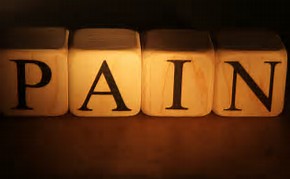1. Pain can have its genesis and manifestation in any or all of three dimensions:• Physical – eg back pain, headache, toothache, arthritic pain etc• Psychological – loneliness, grief, feeling abandoned, depression, anxiety, fear etc• Spiritual – longing, despair, guilt, dark night etc
2. There are different appropriate ways of dealing with pain. We might, for example, deal with the physical pain of arthritis by taking a pain killer but this would hardly be appropriate for the pain of guilt. In these notes I am addressing specifically the psychological and spiritual pain.
3. Pain in one dimension might be masked by pain in another dimension. For example, physical back pain might in fact be more about my psychological loneliness or spiritual longing than my back as such.
4. There are two common reactions – as distinct from responses – to pain:• We become more or less self-absorbed• We ricochet off the pain and*Seek consolation – eg in drugs, sex, gambling, alcohol, workaholism*Project the pain on to others – eg we become cynical, chronically negative, aggressive, insensitive to the pain of others*We turn on ourselves – we become depressed, self-sabotaging, full of self-doubt
5. Unacknowledged and undealt with pain is almost certainly the trigger for most of our inappropriate behaviours. The “problem of obesity”, for example, is in some measure at least a matter of unacknowledged or undealt with pain. To deal with it as if it were simply or even primarily a matter of diet is probably not going to be helpful in the long run. Similarly with our addictive behaviours and those behaviours that cause conflicts in relationships. Listen for the roots of it. The question, “What is happening?” is probably the most practical and constructive life-question we can ask anywhere, anytime.
6. The truth of our pain holds a key to our freedom:• LISTEN to what is happening within you• HEAR what is happening within you• FACE what is happening within you• SUBMIT to the truth of what is happening within you
7. Pain of some kind – especially spiritual pain – is an integral part of life. It is best viewed as promise rather than threat. The aim is not so much to get rid of it as it is to grow because of it. Pray: “Lord, deliver me not from it but in it and through it.”
8. The ANS process is useful to this end, as is Eugene Gendlin’s Focusing.
9. Alcoholics Anonymous has a saying: “If you feel like another drink, ask yourself if you are sad or lonely, anxious or angry.” In other words, they are saying to this person who is potential ruining his/her life with alcohol: “Actually, alcohol is not the real issue. It is a symptom of the real issue. You need to address the real issue.” There is great wisdom in this advice.
10. It might take professional therapy to address the pain.
